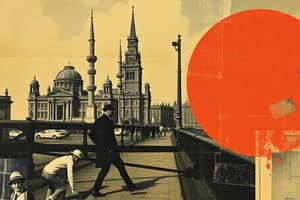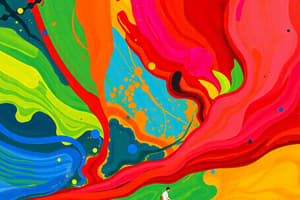Podcast
Questions and Answers
What is the primary purpose of fiscal policy?
What is the primary purpose of fiscal policy?
- To manage the exchange rates between currencies
- To influence the economy through government spending and taxation (correct)
- To regulate the money supply in the economy
- To control inflation through interest rate adjustments
Which of the following best defines inflation?
Which of the following best defines inflation?
- A continuous rise in price levels (correct)
- An increase in government spending
- A significant decline in economic activity
- A situation where revenue exceeds expenditures
What does globalization refer to?
What does globalization refer to?
- The growing independence of nations
- The increasing interdependence and integration of economies worldwide (correct)
- The increase in domestic production capabilities
- The control of trade tariffs by individual countries
Which situation describes a deficit?
Which situation describes a deficit?
What is monetary policy primarily concerned with?
What is monetary policy primarily concerned with?
What is the main focus of economics?
What is the main focus of economics?
What does the concept of scarcity refer to?
What does the concept of scarcity refer to?
Which of the following best defines opportunity cost?
Which of the following best defines opportunity cost?
In which market structure do many sellers offer identical products with no barriers to entry?
In which market structure do many sellers offer identical products with no barriers to entry?
What is a mixed economy?
What is a mixed economy?
What does macroeconomics study?
What does macroeconomics study?
Which economic theory emphasizes government intervention during economic cycles?
Which economic theory emphasizes government intervention during economic cycles?
What does GDP measure?
What does GDP measure?
Flashcards are hidden until you start studying
Study Notes
Definition of Economics
- Study of how individuals, businesses, and governments allocate resources.
- Examines production, distribution, and consumption of goods and services.
Key Concepts
-
Scarcity
- Limited resources vs. unlimited wants.
- Necessitates choices and trade-offs.
-
Opportunity Cost
- The value of the next best alternative foregone when making a decision.
-
Supply and Demand
- Demand: Consumer willingness to purchase goods at different prices.
- Supply: Amount of goods producers are willing to sell at different prices.
- Equilibrium: Point where supply equals demand.
-
Market Structures
- Perfect Competition: Many sellers, identical products, no barriers to entry.
- Monopoly: Single seller dominates the market, high barriers to entry.
- Oligopoly: Few sellers, products may be similar or differentiated.
- Monopolistic Competition: Many sellers, differentiated products.
-
Economic Systems
- Capitalism: Private ownership and free markets.
- Socialism: Government ownership and planned economy.
- Mixed Economy: Combination of capitalism and socialism.
Macroeconomics vs. Microeconomics
- Macroeconomics: Study of the economy as a whole (e.g., inflation, unemployment, GDP).
- Microeconomics: Focuses on individual consumers and businesses (e.g., pricing, supply chains).
Key Indicators
- Gross Domestic Product (GDP): Total value of goods and services produced in a country.
- Unemployment Rate: Percentage of the labor force that is unemployed.
- Inflation Rate: Rate at which the general level of prices for goods and services rises.
Economic Theories
- Classical Economics: Focus on free markets and the idea that markets are self-correcting.
- Keynesian Economics: Advocates for government intervention to manage economic cycles.
- Monetarism: Emphasizes the role of government in controlling the amount of money in circulation.
Fiscal and Monetary Policy
- Fiscal Policy: Government spending and taxation decisions to influence the economy.
- Monetary Policy: Central bank actions to control the money supply and interest rates.
Global Economics
- Trade: Exchange of goods and services between countries.
- Exchange Rates: Value of one currency in relation to another.
- Globalization: Increasing interdependence and integration of economies worldwide.
Economic Challenges
- Recession: A significant decline in economic activity across the economy.
- Inflation: Continuous rise in price levels.
- Deficit: When expenditures exceed revenue.
Conclusion
- Economics is a dynamic field that helps understand decision-making processes and the functioning of markets. It plays a crucial role in policy-making and understanding global interactions.
Definition of Economics
- Economics involves studying allocation of resources by individuals, businesses, and governments.
- Key areas include the production, distribution, and consumption of goods and services.
Key Concepts
- Scarcity: Limited resources versus unlimited wants lead to choices and trade-offs.
- Opportunity Cost: Represents the value of the next best alternative that is not chosen in a decision-making process.
- Supply and Demand:
- Demand reflects consumer willingness to buy at various prices.
- Supply indicates the quantity of goods that producers are ready to sell at different prices.
- Equilibrium occurs when the quantity supplied equals the quantity demanded.
- Market Structures:
- Perfect Competition: Numerous sellers, identical products, no entry barriers.
- Monopoly: A single seller controls the market, facing high entry barriers.
- Oligopoly: A few sellers dominate the market, with similar or differentiated products.
- Monopolistic Competition: Many sellers offer differentiated products.
Economic Systems
- Capitalism: Characterized by private ownership and free market operations.
- Socialism: Involves government ownership and centralized economic planning.
- Mixed Economy: Blends elements of capitalism and socialism for economic management.
Macroeconomics vs. Microeconomics
- Macroeconomics: Studies the economy as a whole, addressing issues like inflation, unemployment, and gross domestic product (GDP).
- Microeconomics: Examines individual consumers and businesses, focusing on aspects such as pricing strategies and supply chains.
Key Indicators
- Gross Domestic Product (GDP): Measures total value of goods and services produced in a nation.
- Unemployment Rate: Percentage of the labor force that is currently without work.
- Inflation Rate: Indicates the rate at which general prices for goods and services increase.
Economic Theories
- Classical Economics: Advocates for free markets and views them as self-correcting entities.
- Keynesian Economics: Promotes the concept of government intervention to stabilize economic fluctuations.
- Monetarism: Emphasizes the government's role in controlling monetary supply and influencing economic stability.
Fiscal and Monetary Policy
- Fiscal Policy: Involves government spending and taxation strategies to impact economic performance.
- Monetary Policy: Encompasses central bank measures aimed at regulating money supply and interest rates.
Global Economics
- Trade: The process of exchanging goods and services internationally.
- Exchange Rates: The value comparison of one currency against another currency.
- Globalization: Describes the growing interdependence of global economies through increased integration.
Economic Challenges
- Recession: Defined as a significant drop in economic activity across the board.
- Inflation: Continuous increase in the price level of goods and services.
- Deficit: Occurs when government expenditures exceed its revenues.
Conclusion
- Economics is a crucial field that provides insights into decision-making and market operations, significantly influencing policy-making and global economic relations.
Studying That Suits You
Use AI to generate personalized quizzes and flashcards to suit your learning preferences.




